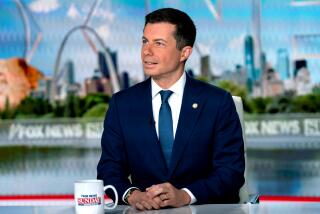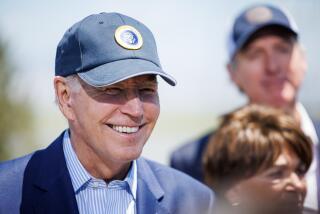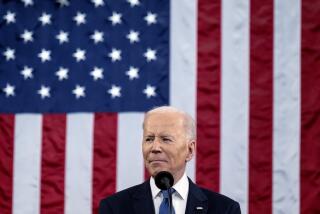Gore Firms Up Political Stance to Soften Critics
- Share via
MANCHESTER, N.H. — On a recent campaign swing, Vice President Al Gore ran smack into a ghost: the ghost of Bill Clinton.
At a health-care forum in New Hampshire, Gore listened as Russell Rowe related the stark choice he faces each month, whether to buy food or the pills he needs to control his diabetes and high blood pressure.
Seven years earlier, a virtually identical scene produced the defining image of then-candidate Clinton. When an elderly New Hampshire woman told the same sorrowful tale, the Arkansas governor stepped forward and she fell, sobbing, into his arms.
But when Gore heard Rowe’s woeful story, the famously self-contained vice president merelylistened, hands at his side. “Mmmm-hmmm,” Gore finally said. “I understand the situationyou’re in.”
Those contrasting encounters capture the challenge facing Gore as he prepares to formally launch his presidential bid Wednesday. Like all vice presidents, he must emerge from the shadow of the man who appointed him and establish an independent identity. In Gore’s case, the challenge is compounded by his own public stiffness and reserve--which has left him, after seven years, an indistinct figure for many Americans.
Polls show Gore substantially trailing the leading Republican contenders--and facing doubts about his leadership and vision. Yet previous vice presidents--from Richard M. Nixon to George Bush--also faced discouraging numbers early in the campaign before emerging as strongly competitive candidates.
For Gore the critical question is how much of his apparent weakness today is generic and how much specific. “The biggest thing Gore has to do is establish himself as a person with his own vision,” says David W. Moore, the managing editor of the nonpartisan Gallup Poll. “It’s the same problem that every vice president faces.”
In fact, as even many Republicans acknowledge, Gore begins his race for the White House with some enviable assets. Chief among them is a roaring economy and a long list of other positive trends--on everything from welfare to crime--that the vice president can marshal in making the case to continue the course set by Clinton.
“There’s a lot of fundamentals in favor of the [vice president] right now with the economy being as strong as it is,” Moore says. “There’s no reason why he shouldn’t be able to run a credible campaign.”
But Gore must still confront the natural itch for change at the end of a two-term presidency, compounded in this case by public frustration with the repeated scandals of the Clinton years. “People are bored with Clinton, they’re bored with Al Gore,” Democratic pollster Alan Secrest says. “There’s a fair amount of sentiment for change for change’s sake, even in a positive environment. That’s something Gore is going to have to battle.”
Gore originally considered announcing as late as this fall. But after a spell of bad press and a batch of bad polls, aides acknowledged a need, as one put it, “to get out from under the umbrella of the president . . . and the quicker the better.”
Uneasy about his poll position against Texas Gov. George W. Bush and concerned about the progress of his sole Democratic challenger, former Sen. Bill Bradley, Gore has already moved more quickly than any previous vice president to begin specifying the policies he would pursue as president.
In two major speeches this spring, Gore has shown no sign of departing from the centrist “New Democrat” direction Clinton has sought to impose on his party.
But moving beyond Clinton’s agenda, Gore has laid out an extensive plan for education reform--including a proposal for universal preschool--and a plan to increase the federal government’s reliance on religion-based charities to deliver social services. (That’s an idea traditionally more associated with Republicans like Bush.) Gore has also talked about restraining suburban sprawl, and he indicated that he will offer a plan to expand access to health care for the uninsured--revisiting the greatest setback of Clinton’s first term.
Aides say Gore hopes to continue outlining his agenda at a rate of about a speech a month; by contrast, Vice President Bush (father of the Texas governor) offered few specifics in the 1988 campaign until after clinching the GOP nomination.
By being so specific so early, Gore hopes to establish a contrast with Bradley as well as Texas Gov. Bush--both of whom have been talking almost entirely in generalities. The vice president also appears to be taking a page from Clinton’s book. In 1992, Clinton bet that an ambitious agenda would trump concerns about his character; now, Gore seems to be wagering that ambitious ideas can trump charisma, as well.
A Southern Baptist, Gore has turned heads by talking more openly than ever about his religious faith. However, he has hit some bumps in this process of self-revelation.
Republicans have ridiculed his claims of growing up on a farm, noting the vice president’s patrician upbringing as the son of a U.S. senator. Nevertheless, Gore will continue highlighting his ties to the small town of Carthage, Tenn.--where he summered on the family farm--by announcing his candidacy there.
In his standard stump speech, Gore now talks about his service in Vietnam, his long marriage to Tipper Gore, and the grandchild they’re expecting later this month; all of that, aides acknowledge, implicitly contrasts with aspects of Clinton’s life that have alienated many Americans. In all, some around him believe, Gore is moving toward a message that effectively promises Americans to maintain the Clintonite policies they support--without the soap opera and scandals.
These recent signs of life have helped Gore quiet sustained grumbling from elected officials and others concerned that his campaign seemed stuck on the runway.
For much of this year, many supporters have complained that Gore was building an unwieldy, unresponsive organization that seemed incapable of making decisions--partly because of Gore’s micro-management.
Last month, the vice president responded by naming Tony Coelho--the House Majority Whip in the late 1980s--as his campaign chairman. The appointment raised eyebrows--Coelho quit Congress amid ethical questions a decade ago and has never been a cutting-edge policy thinker--but he’s considered a skilled political street-fighter and has generally received high marks for imposing order on Gore’s team.
The second source of criticism confronting Gore may take longer to resolve--and prove far more crucial to his hopes of winning the White House. That relates to his ability to convince Americans he has the skill and agenda to fill the top job.
On those fronts, polls have made clear that Gore has a lot of ground to cover. Those surveys consistently show him trailing Bush, the GOP front-runner, by double-digit margins. Likewise, polls have found Gore generating little confidence on a broad range of personal measures. A survey last week found just 30% considered Gore a strong leader; 59% said the phrase applied to Bush. The Pew Research Center recently asked Americans what one word sprang to mind at the mention of Gore. The hands-down winner: “boring.”
History suggests those unenthusiastic responses at least partly measure the enfeebling nature of the vice presidency. Most polls in 1959 showed Vice President Nixon trailing the leading Democrats by substantial margins. In 1987, just 35% of Americans said they considered Vice President Bush a strong leader. Yet Bush came back to win, and Nixon fell just short against the formidable John F. Kennedy. “A lot of Gore’s problem [now] could be vice president’s disease,” acknowledges GOP pollster Fred Steeper, an advisor to the Bushes.
Gore aides--constructing their view from both hope and experience--largely share that conclusion. One senior advisor insists that when voters are shown the differences between Gore and Bush on issues such as gun control, abortion and education, Gore moves ahead in the campaign’s private polling.
But those, of course, are comparisons on paper. It’s in the flesh where Gore must still change hearts and minds. He begins the effort Wednesday with his formal announcement. But that is only a first step--and a small one at that--in what promises to be the most demanding journey this senator’s son has ever undertaken.
More to Read
Get the L.A. Times Politics newsletter
Deeply reported insights into legislation, politics and policy from Sacramento, Washington and beyond. In your inbox twice per week.
You may occasionally receive promotional content from the Los Angeles Times.











